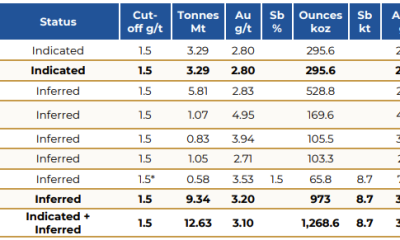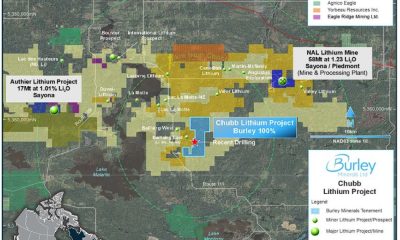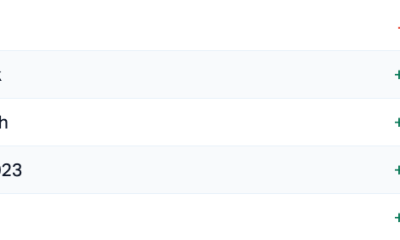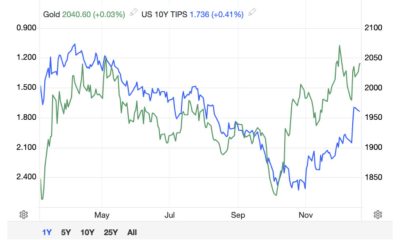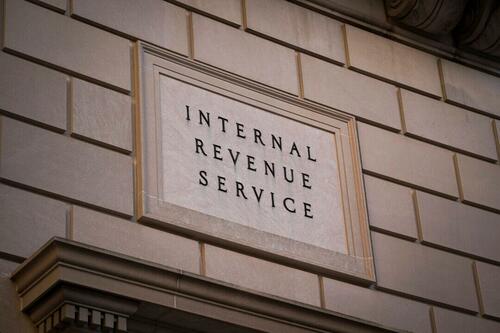Uncategorized
In The World of Tomorrow, Albemarle still says lithium will reign supreme in EV game
Albemarle’s Australian country manager says sodium ion batteries are unlikely to displace lithium in passenger EVs. … Read More
The post In The World…

- The world’s biggest lithium miner Albemarle remains confident demand will rise as EV penetration gathers pace
- Australian country manager Beverley East’s comments at WA Mining Club event come same month Gina Rinehart scuppered a deal to grow its Australian spodumene empire via Liontown Resources takeover
- Albemarle investing over $4 billion in downstream processing in Australia
Albemarle has faced a technology cliff before.
Founded in 1887 as a producer of Kraft and blotting paper, the business engineered one of the great pivots in 1962 in a kind of reverse takeover of Ethyl Corporation.
The US$200 million chemical manufacturer was on the nose with its owner General Motors, believed to be terrified of litigation from poisoning caused by the fuel additive it sold, tetraethyl lead.
Unleaded fuel was on its way in and the TEL business wouldn’t last forever. Cue a series of zags that eventually included the 2015 purchase of US$6.2 billion of Rockwood Holdings.
Rockwood was a big player in a niche industry producing lithium chemicals for the ceramics and lithium battery industries.
It owned brines producing lithium carbonate on Chile’s Atacama Salar, the Silver Peak mine in Nevada and 49% of Greenbushes in WA, the world’s largest and highest grade lithium deposit.
It was a prescient move. Even with a major pullback from last year’s astonishing highs of US$325 per share, at ~US$135 today, US$16b ($25b) NASDAQ listed Albemarle is up well over double since the Rockwood plunge.
This year’s roughly quartering of lithium chemical prices followed fears about the cost of EV batteries as prices surged in 2022, raising concerns from investors it could be substituted for cheaper alternatives like sodium ion.
Speaking to a packed room at a WA Mining Club luncheon at Optus Stadium in Perth yesterday, Albemarle’s Australian head allayed concerns the lithium boom so valuable to a country responsible for half of global supply would be retired by new technology.
Albemarle has long bandied projections that lithium demand would rise 10x between 2020 and 2030 to 3.7Mt lithium carbonate equivalent.
With EV penetration rising, Albemarle’s Australian country manager and VP of External Affairs Beverley East said the growth curve ‘will never reverse course’.
“Most of you have probably tapped into some of the discussion about sodium ion batteries and what role they might be able to play going forward,” she said.
“I think we all understand that sodium ion batteries are a fascinating idea and it is a real idea.
“But all the experts I speak to tell me that they think it’s unlikely to be the technology of choice for passenger vehicles going forward.
“Albemarle is confident that EVs will always require lithium batteries of some form and that the urgent need to transition to clean energy creates sufficient demand and there is room for multiple technologies and approaches for the foreseeable future.
“The growth curve may slow at certain times, but it is never going to reverse course. Medium and long term demand will be greater than supply and that bodes very well for Western Australia and of course very well for Albemarle and other lithium producers.”
The call comes amid short term headwinds. Lithium chemical prices have fallen from over US$80,000/t to a little over US$20,000/t in China this year as supply growth has outpaced a roughly 30% increase in EV sales in the world’s largest electric vehicle and battery market.
READ: Is your lithium stock having a rough week? China may have something to do with it
Industry reshapes as billionaires muscle in
If the International Energy Agency’s net zero roadmap comes to fruition — a tall task given the push back from many governments and old world energy producers — around 2 billion EVs will need to be on the road by 2050.
At an average grade of 1.2% Li2O, East says around 1Bt of raw spodumene ore or its equivalent would need to be mined to meet future demand if EVs contain the 2023 standard 8kg in each battery pack.
Along with mining operations, Albemarle is also a major chemical producer and is close to selling battery grade material from its Kemerton plant near Bunbury.
The first of four trains there is commissioned and undergoing product qualification with customers, while the second train is in the middle of a two-year commissioning phase.
Once fully operational they will produce 50,000t of battery grade lithium hydroxide a year. Another two trains to double that capacity have been approved, taking the company’s spend to over $4 billion on the project.
At 100,000tpa, East says it will be the largest single site conversion facility in the world and apply what is for now the most advanced manufacturing tech globally.
Albemarle’s factory is running alongside the slow to ramp 24,000tpa Kwinana plant currently undergoing product qualification under the watch of its Greenbushes JV partners Tianqi and IGO (ASX:IGO), and the Covalent Lithium JV between Chile’s SQM and Wesfarmers (ASX:WES) to develop an Australian lithium chemicals industry.
It’s a show of Albemarle’s confidence in the long-term future of the lithium market, with East saying its R&D teams who are working on next generation battery technology believe internally the next wave of EV batteries aiming for higher energy density and improved safety may need more lithium than current technology.
Albemarle isn’t the only major that’s so bullish on the outlook for the battery metal though.
Also half-owner of the Wodgina JV with MinRes (ASX:MIN), ALB recently tried to expand further in WA by offering $3 a share for Liontown Resources (ASX:LTR), only to walk away from its $6.6 billion bid when Gina Rinehart’s Hancock Prospecting spent $1.3 billion to build a blocking stake.
It would not have been easy to ditch plans to acquire a mine set to produce 500,000t of spodumene per annum from mid-2024, one of a handful of operations of global scale to come online in the coming years.
East said Albemarle considers “Western Australia as totally critical to to our strategic growth in energy storage” but that the company needed to consider its global priorities after Rinehart’s interjection clouded a more than four-week long due diligence process.
Early reports suggest Rinehart could be trying the same tactic at Azure Minerals (ASX:AZS), 60% owner of the promising Andover pegmatite discovery, whose Tony Rovira-led board accepted a $3.52 per share cash bid from SQM yesterday valuing the miner at $1.63b.
Intriguingly, that offer appears to value legendary prospector Mark Creasy’s private 40% stake in the project near Roebourne at $1.08 billion. Codelco meanwhile tipped a big premium in for Lithium Power International (ASX:LPI) in a 57c a share offer to take out the ASX-listed owner of the Maricunga project in Chile for $385m.
If the other major players are as bullish as Albemarle, don’t be surprised if more M&A arises, with the big American also making early stage bets on Western Lithium, a $30m purchase of an LPI spinoff that held tenements near Greenbushes, and Patriot Battery Metals (ASX:PMT), where it tipped C$109m in for a roughly 5% stake and foot in the door of the owner of Canada’s second biggest spodumene deposit.
READ: Ground Breakers: Azure attracts $1.63bn SQM splurge, nabbing holders a 1430% gain
The post In The World of Tomorrow, Albemarle still says lithium will reign supreme in EV game appeared first on Stockhead.


